Presidenza di James Madison
La presidenza di James Madison ebbe inizio il 4 marzo 1809 con la cerimonia d'insediamento del presidente degli Stati Uniti d'America e terminò il 4 marzo 1817. Madison assunse l'incarico di quarto presidente degli Stati Uniti dopo aver battuto il suo avversario Charles Cotesworth Pinckney alle elezioni presidenziali del 1808.
| Presidenza James Madison | |
|---|---|
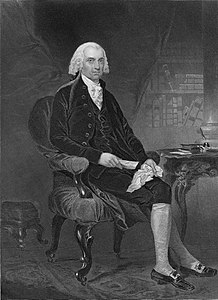 | |
| Stato | |
| Capo del governo | James Madison (Partito Democratico-Repubblicano) |
| Giuramento | 4 marzo 1809 |
| Governo successivo | 4 marzo 1817 |
«Tutte le società civilizzate sono divise in fazioni e interessi diversi, potendovisi trovare debitori o creditori, ricchi o poveri, contadini, mercanti o artigiani, membri di regioni differenti, seguaci di vari leader politici, possessori di molte specie di proprietà. Nel governo repubblicano è la maggioranza, comunque composta, che in ultima analisi detta legge... quando un interesse definito o una passione comune produce una maggioranza»
Fu rieletto quattro anni dopo, sconfiggendo DeWitt Clinton alle elezioni presidenziali del 1812.
La sua presidenza fu dominata quasi interamente dalla guerra anglo-americana. Gli succedette il segretario di Stato James Monroe, un membro del Partito Democratico-Repubblicano.
Elezioni presidenziali del 1808 modifica
Amministrazione modifica
Gabinetto ministeriale modifica
- Partiti politici
Democratico-Repubblicano Federalista Indipendente
| Dipartimento | Incarico | Ritratto | Nome | Mandato | ||
|---|---|---|---|---|---|---|
| Inizio | Termine | |||||
 | Presidente |  | James Madison | 4 marzo 1809 | 4 marzo 1817 | |
 | Vicepresidente |  | George Clinton | 4 marzo 1809 | 20 aprile 1812 | |
 | Elbridge Gerry | 4 marzo 1813 | 23 novembre 1814 | |||
 | Segretario di Stato | 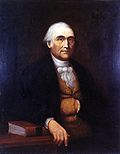 | Robert Smith | 6 marzo 1809 | 1º aprile 1811 | |
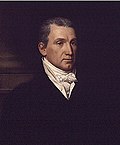 | James Monroe | 6 aprile 1811 | 4 marzo 1817 | |||
 | Segretario al tesoro |  | Albert Gallatin | 4 marzo 1809 | 8 febbraio 1814 | |
 | George Washington Campbell | 9 febbraio 1814 | 5 ottobre 1814 | |||
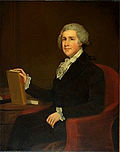 | Alexander James Dallas | 6 ottobre 1814 | 21 ottobre 1816 | |||
 | William Harris Crawford | 22 ottobre 1816 | 4 marzo 1817 | |||
 | Segretario alla Guerra |  | William Eustis | 7 marzo 1809 | 13 gennaio 1813 | |
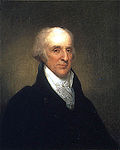 | John Armstrong Junior | 13 gennaio 1813 | 27 settembre 1814 | |||
 | James Monroe | 27 settembre 1814 | 2 marzo 1815 | |||
 | William Harris Crawford | 1º agosto 1815 | 22 ottobre 1816 | |||
| *** | George Graham | 22 ottobre 1816 | 4 marzo 1817 | |||
 | Procuratore generale |  | Caesar Augustus Rodney | 4 marzo 1809 | 5 dicembre 1811 | |
 | William Pinkney | 11 dicembre 1811 | 9 febbraio 1814 | |||
 | Richard Rush | 10 febbraio 1814 | 4 marzo 1817 | |||
 | Direttore generale delle poste |  | Gideon Granger | 4 marzo 1809 | 17 marzo 1814 | |
 | Return Jonathan Meigs | 17 marzo 1814 | 4 marzo 1817 | |||
 | Segretario alla Marina | 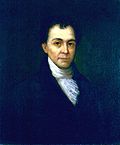 | Paul Hamilton | 15 maggio 1809 | 1º gennaio 1813 | |
 | William Jones | 19 gennaio 1813 | 1º dicembre 1814 | |||
 | Benjamin Williams Crowninshield | 16 gennaio 1815 | 4 marzo 1817 | |||
Vicepresidenza modifica
Nomine giuridiche modifica
Emendamenti costituzionali modifica
Nuovi stati ammessi nell'Unione modifica
Agenda economica anteguerra modifica
Florida occidentale modifica
Affare Wilkinson modifica
Guerra anglo-americana modifica
Preludio modifica
Azioni militari modifica
Dopoguerra modifica
Collasso dei federalisti modifica
Politica economica modifica
Seconda guerra barbaresca modifica
Relazioni con i nativi americani modifica
Scadenze elettorali modifica
Elezioni presidenziali del 1812 modifica
Elezioni presidenziali del 1816 modifica
Reputazione storica modifica
Note modifica
- ^ Citato in Mario Francini Storia dei presidenti americani Tascabili Newton 1996, pp. 20-21
Bibliografia modifica
- Andrew Burstein e Nancy Isenberg, Madison and Jefferson, Random House, 2010.
- Daniel Walker Howe, What Hath God Wrought: The Transformation of America 1815–1848, Oxford University Press, 2007, ISBN 978-0-19-507894-7.
- Ralph Ketcham, James Madison: A Biography, Macmillan, 1971.
- Rutland, Robert A. The Presidency of James Madison (Univ. Press of Kansas, 1990). ISBN 978-0700604654.
- Wills, Garry. James Madison: The American Presidents Series: The 4th President, 1809-1817 (Times Books, 2002).
- Gordon S. Wood, Empire of Liberty: A History of the Early Republic, Oxford University Press, 2011, ISBN 978-0-19-983246-0.
Sondaggi e riferimenti modifica
- Adams, Henry. History of the United States during the Administrations of James Madison (5 vol 1890–1891; 2 vol Library of America, 1986). ISBN 0-940450-35-6 Table of contents
- Wills, Garry. Henry Adams and the Making of America. (2005); a retelling of Adams' history
- Buel Jr, Richard, and Jeffers Lennox. Historical dictionary of the early American republic (2nd ed. 2016). excerpt
- Channing, Edward. A history of the United States: volume IV: Federalists and Republicans 1789-1815 (1917) pp. 402–566 online; Old, highly detailed narrative
- DeConde, Alexander. A History of American Foreign Policy (1963) online edition Archiviato il 4 giugno 2011 in Internet Archive. pp. 97–125
- Ketcham, Ralph. "James Madison" in Henry Graff, ed. The Presidents: A Reference History (3rd ed. 2002) online
- Rutland, Robert A. ed. James Madison and the American Nation, 1751–1836: An Encyclopedia (Simon & Schuster, 1994).
- Schouler, James. History of the United States of America Under the Constitution: vol 2 1801-1817 (2nd ed. 1894) pp. 310–517; old detailed narrative; complete text online
- Smelser, Marshall. The Democratic Republic, 1801 1815 (1969) in The New American Nation Series.
Biografie modifica
- Brant, James. James Madison: The President, 1809–1812 (1956)
- Brant, James. James Madison: Commander in Chief, 1812-1836 (1956)
- Irving Brant, The Fourth President; a Life of James Madison, Easton Press, 1970. Single volume condensation of his 6-vol biography
- Broadwater, Jeff. James Madison: A Son of Virginia and a Founder of a Nation. (U of North Carolina Press, 2012).
- Chadwick, Bruce. James and Dolley Madison: America's First Power Couple (Prometheus Books; 2014) 450 pages; detailed popular history
- Howard, Hugh. Mr. and Mrs. Madison's War: America's First Couple and the War of 1812 (Bloomsbury, 2014).
- Ketcham, Ralph. James Madison: A Biography (1971), 755pp; excerpt
- Rutland, Robert A. James Madison: The Founding Father. New York: Macmillan Publishing Co., 1987. ISBN 978-0-02-927601-3.
- Skeen, Carl Edward. "Mr. Madison's Secretary of War." Pennsylvania Magazine 100 (1976): 336-55. on John Armstrong, Jr.
- Skeen, C. Edward. John Armstrong, Jr., 1758-1843: A Biography (1981), Scholarly biography of the Secretary of War.
- Walters, Raymond. Albert Gallatin: Jeffersonian Financier and Diplomat (1957).
Studi accademici modifica
- Banner, Jr., James M., Responses of the Presidents to Charges of Misconduct, a cura di C. Vann Woodward, 1974, ISBN 0-440-05923-2.
- Belko, William S. "The Origins of the Monroe Doctrine Revisited: The Madison Administration, the West Florida Revolt, and the No Transfer Policy." Florida Historical Quarterly 90.2 (2011): 157-192. in JSTOR
- Bickham, Troy. The Weight of Vengeance: The United States, the British Empire, and the War of 1812 (Oxford UP, 2012).
- Broadwater, Jeff. "James Madison, the War of 1812 and the Paradox of a Republican Presidency." Maryland Historical Magazine, 109#4 (2014): 428-51.
- Buel, Richard. America on the Brink: How the Political Struggle Over the War of 1812 Almost Destroyed the Young Republic (2015).
- Fitz, Caitlin A. "The Hemispheric Dimensions of Early US Nationalism: The War of 1812, Its Aftermath, and Spanish American Independence." Journal of American History 102.2 (2015): 356-379.
- Gates, Charles M. "The West in American Diplomacy, 1812-1815." Mississippi Valley Historical Review 26.4 (1940): 499-510. in JSTOR
- Hatzenbuehler, Ronald L. "Party Unity and the Decision for War in the House of Representatives, 1812." William and Mary Quarterly (1972) 29#3: 367-390. in JSTOR
- Hatzenbuehler, Ronald L., and Robert L. Ivie. "Justifying the War of 1812: Toward a Model of Congressional Behavior in Early War Crises." Social Science History 4.4 (1980): 453-477.
- Hill, Peter P. Napoleon's Troublesome Americans: Franco-American Relations, 1804-1815 (Potomac Books, Inc., 2005).
- Kaplan, L. S. "France and Madison's decision for war, 1812." Mississippi Valley Historical Review (1964) 50: 652–671.
- Kleinerman, Benjamin A. "The Constitutional Ambitions of James Madison's Presidency." Presidential Studies Quarterly 44.1 (2014): 6-26.
- Leiner, Frederick C. The end of Barbary terror: America's 1815 war against the pirates of North Africa (Oxford UP, 2006).
- Nester, William R. Titan: The Art of British Power in the Age of Revolution and Napoleon (U of Oklahoma Press, 2016).
- Pancake, John S. "The 'Invisibles': A Chapter in the Opposition to President Madison." Journal of Southern History 21.1 (1955): 17-37. in JSTOR
- Perkins, Bradford. Prologue to War: England and the United States, 1805-1812 (U of California Press, 1961). full text online free
- Perkins, Bradford. Castlereagh and Adams: England and the United States, 1812-1823 (U of California Press, 1964).
- Risjord, Norman K. "1812: Conservatives, War Hawks and the Nation's Honor." William and Mary Quarterly (1961) 18#2: 196-210. in JSTOR
- Siemers, David J. "Theories about Theory: Theory‐Based Claims about Presidential Performance from the Case of James Madison." Presidential Studies Quarterly 38.1 (2008): 78-95.
- Siemers, David J. "President James Madison and Foreign Affairs, 1809–1817: Years of Principle and Peril." in Stuart Leibiger ed., A Companion to James Madison and James Monroe (2012): 207-223.
- Snow, Peter. When Britain Burned the White House: The 1814 Invasion of Washington (2014).
- Stagg, John C. A. Mr. Madison's War: Politics, Diplomacy, and Warfare in the Early American Republic, 1783-1830 (1983).
- Stagg, J.C.A. The War of 1812: Conflict for a Continent (Cambridge UP, 2012) short survey.
- Stagg, John C. A. "James Madison and the 'Malcontents': The Political Origins of the War of 1812," William and Mary Quarterly 33#4 (1976), pp. 557–85. in JSTOR
- Stagg, John C. A. "James Madison and the Coercion of Great Britain: Canada, the West Indies, and the War of 1812," in William and Mary Quarterly 38#1 (1981), 3–34. in JSTOR
- Stagg, John C. A. Mr. Madison's War: Politics, Diplomacy, and Warfare in the Early American republic, 1783–1830. (Princeton UP, 1983).
- Stagg, John C. A. Borderlines in Borderlands: James Madison and the Spanish-American Frontier, 1776–1821 (2009)
- Stuart, Reginald C. Civil-military Relations During the War of 1812 (ABC-CLIO, 2009).
- Sugden, John. "The Southern Indians in the War of 1812: The Closing Phase." Florida Historical Quarterly 60.3 (1982): 273—312.
- Trautsch, Jasper M. "' Mr. Madison's War' or the Dynamic of Early American Nationalism?." Early American Studies: An Interdisciplinary Journal 10.3 (2012): 630-670. online
- White, Leonard D. The Jeffersonians: A Study in Administrative History, 1801–1829 (1951), explains the operation and organization of federal administration
- Zinman, Donald A. "The Heir Apparent Presidency of James Madison." Presidential Studies Quarterly 41.4 (2011): 712-726.
Storiografia modifica
- Leibiger, Stuart, ed. A Companion to James Madison and James Monroe (2012) excerpt
- Haworth, Peter Daniel. "James Madison and James Monroe Historiography: A Tale of Two Divergent Bodies of Scholarship." in A Companion to James Madison and James Monroe (2013): 521-539.
- Trautsch, Jasper M. "The causes of the War of 1812: 200 years of debate." Journal of Military History 77.1 (2013): 275-93. online
Fonti primarie modifica
- James Madison, Letters & Other Writings Of James Madison Fourth President Of The United States, called the Congress edition, J.B. Lippincott & Co, 1865.
- James Madison, The Writings of James Madison, a cura di Gaillard Hunt, ed., G. P. Putnam's Sons, 1900–1910.
- Madison, James. The papers of James Madison. Presidential series; 1. 1 March-30 September 1809. Ed. Robert A. Rutland. University Press of Virginia, 1984. review of vol 6
- series in James Madison, The Papers of James Madison, a cura di William T. Hutchinson et al., eds., 30 volumes published and more planned, Univ. of Chicago Press, 1962 (archiviato dall'url originale il 13 ottobre 2011).
- James Madison, The Republic of Letters: The Correspondence Between Thomas Jefferson and James Madison, 1776–1826, a cura di James M. Smith, ed., W.W. Norton, 1995, ISBN 0-393-03691-X.
- James Madison, James Madison, Writings, a cura di Jack N. Rakove ed., Library of America, 1999, ISBN 1-883011-66-3.
- Richardson, James D. ed. A Compilation of the Messages and Papers of the Presidents (1897), reprints his major messages and reports.
Voci correlate modifica
- Abolizionismo negli Stati Uniti d'America
- Allevamento di schiavi negli Stati Uniti d'America
- Candidati alla presidenza degli Stati Uniti d'America per partiti minori
- Classifica storica dei presidenti degli Stati Uniti d'America
- Condizioni di vita degli schiavi negli Stati Uniti d'America
- Dipartimenti dell'Esecutivo federale degli Stati Uniti d'America
- Diritti umani negli Stati Uniti d'America
- Diritto degli Stati Uniti d'America
- Elezioni presidenziali negli Stati Uniti d'America del 1808
- Elezioni presidenziali negli Stati Uniti d'America del 1812
- Elezioni presidenziali negli Stati Uniti d'America del 1816
- First lady degli Stati Uniti d'America
- Gabinetto degli Stati Uniti d'America
- Governo federale degli Stati Uniti d'America
- Insediamento del presidente degli Stati Uniti d'America
- Linea di successione presidenziale negli Stati Uniti d'America
- Ordine delle cariche degli Stati Uniti d'America
- Nativi americani degli Stati Uniti d'America
- Presidente degli Stati Uniti d'America
- Presidente eletto degli Stati Uniti d'America
- Presidenti degli Stati Uniti d'America
- Presidenti degli Stati Uniti d'America per durata
- Razzismo negli Stati Uniti d'America
- Religioni negli Stati Uniti d'America
- Schiavitù negli Stati Uniti d'America
- Sistema politico degli Stati Uniti d'America
- Storia degli Stati Uniti d'America (1789-1849)
- Vicepresidente degli Stati Uniti d'America
Collegamenti esterni modifica
- James Madison: A Resource Guide at the Library of Congress
- The James Madison Papers, 1723–1836 at the Library of Congress
- James Madison: Philosopher and Practitioner of Liberal Democracy, symposium at the Library of Congress
- The Papers of James Madison, subset of Founders Online from the National Archives
- James Madison at the White House
- American President: James Madison (1751–1836) at the Miller Center of Public Affairs, University of Virginia
- James Madison at the Online Library of Liberty, Liberty Fund
- The Papers of James Madison at the Avalon Project
- "Writings of Jefferson and Madison" from C-SPAN's American Writers: A Journey Through History
- (EN) Opere di Presidenza di James Madison, in Progetto Gutenberg.
- Scheda su Internet Archive
- Scheda su Librivox
- James Madison Personal Manuscripts
| Controllo di autorità | LCCN (EN) sh85140425 · J9U (EN, HE) 987007565796705171 |
|---|


